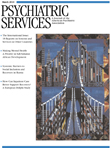To Screen or Not to Screen for Hepatitis C Infection?
To the Editor: The report by Kakisi and colleagues (
1 ) in the September 2009 issue on the high prevalence of hepatitis C virus (HCV) infection among patients with psychiatric disorders is in line with other reports of increased rates of HCV infection in patient populations with psychiatric disorders (three to ten times the rates in the general population) (
1,
2 ). Kakisi and colleagues concluded that routine screening for HCV should be implemented for patients with psychiatric disorders. I contend that the evidence for such recommendation is equivocal at best and needs to be examined closely and evaluated cautiously (
3 ).
Recommendations of the Centers for Disease Control and Prevention support screening for HCV infection among patients who have psychiatric disorders with a history of intravenous drug use. Routine HCV screening has been implemented for patients at Department of Veterans Affairs hospitals (prevalence around 6%) and for incarcerated individuals (prevalence as high as 20%).
However, the U.S. Preventive Services Task Force (USPSTF), a nonfederal group of health experts that makes recommendations about preventive health care, found insufficient evidence to recommend for or against routine screening for HCV infection among high-risk asymptomatic adults (
4 ). The USPSTF made its recommendation because it found no studies proving that screening for HCV infection leads to better long-term clinical outcomes—specifically, to fewer cases of HCV-related chronic disease and fewer deaths that are attributable to actions taken as a result of screening (for example, counseling and treatment) (
4 ).
An argument can be made that adult patients with psychiatric disorders should be screened for HCV because they are a unique population by virtue of their psychiatric symptomatology and because of the increased morbidity and mortality associated with the combination of HCV infection and psychiatric disorders (
2,
3 ). Nonetheless, my study of outcomes of HCV screening for patients with psychiatric disorders showed that only a minority of those who screened positive for HCV infection were considered for treatment and an even smaller minority actually received HCV antiviral treatment (
2 ). Freudenreich and colleagues (
5 ) reported that after two years of HCV screening of patients enrolled in a clozapine clinic, none who screened positive were referred for evaluation or received HCV antiviral treatments.
Where does this body of conflicting evidence leave us? HCV is a viral liver infection associated with increased morbidity and mortality in psychiatric populations. HCV treatments, however, have not been proven to reduce morbidity or mortality. This calls for an individualized approach to screening for HCV in psychiatric populations. Questions that may help target screening include these: What are the risk factors (for example, intravenous drug use or other high-risk practices)? Is a patient in a high-risk group or symptomatic (that is, elevated liver transaminases, fatigue, or cognitive issues)? Will the patient benefit from screening in terms of counseling to modify behavior or reduce and eliminate alcohol intake? Evidence that new HCV antiviral medications improve treatment and reduce morbidity and mortality from HCV infection will make a stronger case for routine HCV screening for patients with psychiatric disorders.

